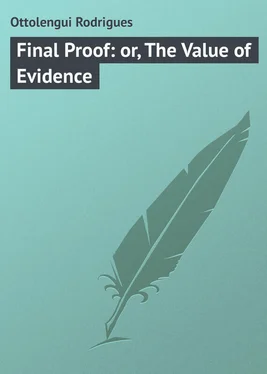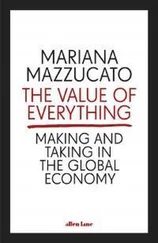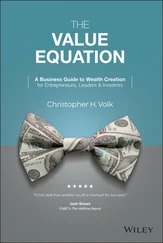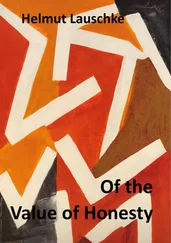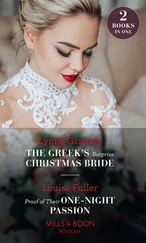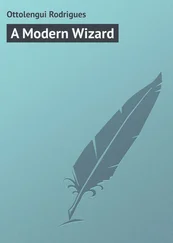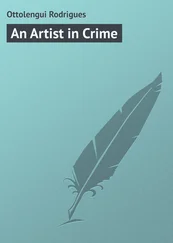Rodrigues Ottolengui - Final Proof - or, The Value of Evidence
Здесь есть возможность читать онлайн «Rodrigues Ottolengui - Final Proof - or, The Value of Evidence» — ознакомительный отрывок электронной книги совершенно бесплатно, а после прочтения отрывка купить полную версию. В некоторых случаях можно слушать аудио, скачать через торрент в формате fb2 и присутствует краткое содержание. Жанр: foreign_prose, на английском языке. Описание произведения, (предисловие) а так же отзывы посетителей доступны на портале библиотеки ЛибКат.
- Название:Final Proof: or, The Value of Evidence
- Автор:
- Жанр:
- Год:неизвестен
- ISBN:нет данных
- Рейтинг книги:3 / 5. Голосов: 1
-
Избранное:Добавить в избранное
- Отзывы:
-
Ваша оценка:
- 60
- 1
- 2
- 3
- 4
- 5
Final Proof: or, The Value of Evidence: краткое содержание, описание и аннотация
Предлагаем к чтению аннотацию, описание, краткое содержание или предисловие (зависит от того, что написал сам автор книги «Final Proof: or, The Value of Evidence»). Если вы не нашли необходимую информацию о книге — напишите в комментариях, мы постараемся отыскать её.
Final Proof: or, The Value of Evidence — читать онлайн ознакомительный отрывок
Ниже представлен текст книги, разбитый по страницам. Система сохранения места последней прочитанной страницы, позволяет с удобством читать онлайн бесплатно книгу «Final Proof: or, The Value of Evidence», без необходимости каждый раз заново искать на чём Вы остановились. Поставьте закладку, и сможете в любой момент перейти на страницу, на которой закончили чтение.
Интервал:
Закладка:
"Suppose," said he, "that it could be shown that the ashes now in the urn at the cemetery are the ashes of a human being?"
"You will be smart if you can prove that," said Mr. Quadrant. "Ashes are ashes, I take it, and you will get little proof there. But since you discussed my proposition, I will argue with you about yours. You say, suppose the ashes are those of a human being. Very well, then, that would prove that my brother was cremated after all, and that I have been guying you, playing with you as a fisherman who fools a fish with feathers instead of real bait."
"But what of the identification of the body at the Morgue?"
"Was there ever a body at the Morgue that was not identified a dozen times? People are apt to be mistaken about their friends after death."
"But this identification was quite complete, being backed up by scientific reasons advanced by experts."
"Yes, but did you ever see a trial where expert witnesses were called, that equally expert witnesses did not testify to the exact contrary? Let me ask you a question. Have you seen this body at the Morgue?"
"Not yet."
"Go and see it. Examine the sole of the left foot. If you do not find a scar three or four inches long the body is not that of my brother. This scar was the result of a bad gash made by stepping on a shell when in bathing. He was a boy at the time, and I was with him."
"But, Mr. Quadrant," said Mr. Barnes, astonished by the new turn of the conversation, "I understood that you yourself admitted that the identification was correct."
"The body was identified by Dr. Mortimer first. My sister and my brother agreed with the doctor, and I agreed with them all, for reasons of my own."
"Would you mind stating those reasons?"
"You are not very shrewd if you cannot guess. I want this matter dropped. Had I denied the identity of the body it must have remained at the Morgue, entailing more newspaper sensationalism. By admitting the identity, I hoped that the body would be given to us for burial, and that the affair would then be allowed to die."
"Then if, as you now signify, this is not your brother's body, what shall I think of your suggestion that you yourself placed the body in the river?"
"What shall you think? Why, think what you like. That is your affair. The less you think about it, though, the better pleased I should be. And now really I cannot permit this conversation to be prolonged. You must go, and if you please I wish that you do not come here again."
"I am sorry that I cannot promise that. I shall come if I think it necessary. This is your sister's house, I believe, and she has expressed a wish that I pursue this case to the end."
"My sister is a fool. At any rate, I can assure you, you shall not get another chance at me, so make the most of what information I have given you. Good morning."
With these words Mr. Mark Quadrant walked out of the room, leaving Mr. Barnes alone.
Mr. Barnes stood for a moment in a quandary, and then decided upon a course of action. He touched the bell which he knew would call the butler, and then sat down by the grate fire to wait. Almost immediately his eye fell upon a bit of white paper protruding from beneath a small rug, and he picked it up. Examining it closely, he guessed that it had once contained some medicine in powder form, but nothing in the shape of a label, or traces of the powder itself, was there to tell what the drug had been.
"I wonder," thought he, "whether this bit of paper would furnish me with a clue? I must have it examined by a chemist. He may discern by his methods what I cannot detect with the naked eye."
With this thought in his mind, he carefully folded the paper in its original creases and deposited it in his wallet. At that moment the butler entered.
"What is your name?" asked Mr. Barnes.
"Thomas, sir," said the man, a fine specimen of the intelligent New York negro. "Thomas Jefferson."
"Well, Thomas, I am a detective, and your mistress wishes me to look into the peculiar circumstances which, as you know, have occurred. Are you willing to help me?"
"I'll do anything for the mistress, sir."
"Very good. That is quite proper. Now, then, do you remember your master's death?"
"Yes, sir."
"And his funeral?"
"Yes, sir."
"You know when the undertaker and his men came and went, and how often, I presume? You let them in and saw them?"
"I let them in, yes, sir. But once or twice they went out without my knowing."
"At five o'clock on the afternoon before the funeral, I am told that Mrs. Quadrant visited the room where the body was, and ordered that the coffin should be closed for the last time. Did you know this?"
"No, sir."
"I understand that at that time the undertaker and two of his men were in the room, as were also the two Mr. Quadrants, Mrs. Quadrant, and the doctor. Now, be as accurate as you can, and tell me in what order and when these persons left the house."
"Dr. Mortimer went away, I remember, just after Mrs. Quadrant went to her room to lie down. Then the gentlemen went in to dinner, and I served them. The undertaker and one of his men left together just as dinner was put on table. I remember that because the undertaker stood in the hall and spoke a word to Mr. Amos just as he was entering the dining-room. Mr. Amos then turned to me, and said for me to show them out. I went to the door with them, and then went back to the dining-room."
"Ah! Then one of the undertaker's men was left alone with the body?"
"I suppose so, unless he went away first. I did not see him go at all. But, come to think of it, he must have been there after the other two went away."
"Why?"
"Because, when I let out the undertaker and his man, their wagon was at the door, but they walked off and left it. After dinner it was gone, so the other man must have gone out and driven off in it."
"Very probably. Now, can you tell me this man's name? The last to leave the house, I mean?"
"I heard the undertaker call one 'Jack,' but I do not know which one."
"But you saw the two men – the assistants, I mean. Can you not describe the one that was here last?"
"Not very well. All I can say is that the one that went away with the undertaker was a youngish fellow without any mustache. The other was a short, thick-set man, with dark hair and a stubby mustache. That is all I noticed."
"That will be enough. I can probably find him at the undertaker's. Now, can you remember whether either of the gentlemen sat up with the corpse that night?"
"Both the gentlemen sat in here till ten o'clock. The body was across the hall in the little reception-room near the front door. About ten the door-bell rang, and I let in the doctor, who stopped to ask after Mrs. Quadrant. He and Mr. Amos went up to her room. The doctor came down in a few minutes, alone, and came into this room to talk with Mr. Mark."
"How long did he stay?"
"I don't know. Not long, I think, because he had on his overcoat. But Mr. Mark told me I could go to bed, and he would let the doctor out. So I just brought them a fresh pitcher of ice-water, and went to my own room."
"That is all, then, that you know of what occurred that night?"
"No, sir. There was another thing, that I have not mentioned to any one, though I don't think it amounts to anything."
"What was that?"
"Some time in the night I thought I heard a door slam, and the noise woke me up. I jumped out of bed and slipped on some clothes and came as far as the door here, but I did not come in."
"Why not?"
"Because I saw Mr. Amos in here, standing by the centre-table with a lamp in his hand. He was looking down at Mr. Mark, who was fast asleep alongside of the table, with his head resting on his arm on the table."
"Did you notice whether Mr. Amos was dressed or not?"
Читать дальшеИнтервал:
Закладка:
Похожие книги на «Final Proof: or, The Value of Evidence»
Представляем Вашему вниманию похожие книги на «Final Proof: or, The Value of Evidence» списком для выбора. Мы отобрали схожую по названию и смыслу литературу в надежде предоставить читателям больше вариантов отыскать новые, интересные, ещё непрочитанные произведения.
Обсуждение, отзывы о книге «Final Proof: or, The Value of Evidence» и просто собственные мнения читателей. Оставьте ваши комментарии, напишите, что Вы думаете о произведении, его смысле или главных героях. Укажите что конкретно понравилось, а что нет, и почему Вы так считаете.
